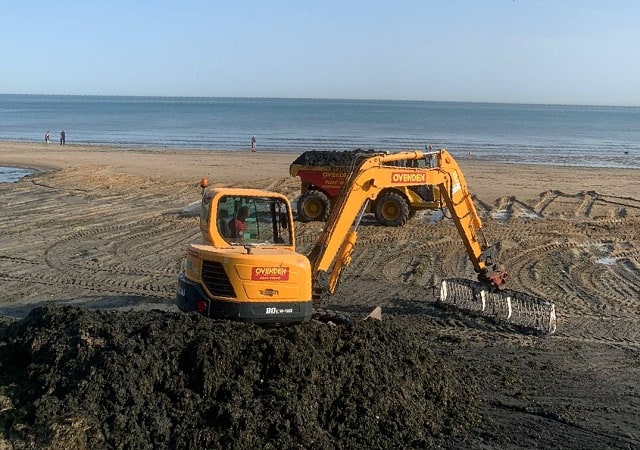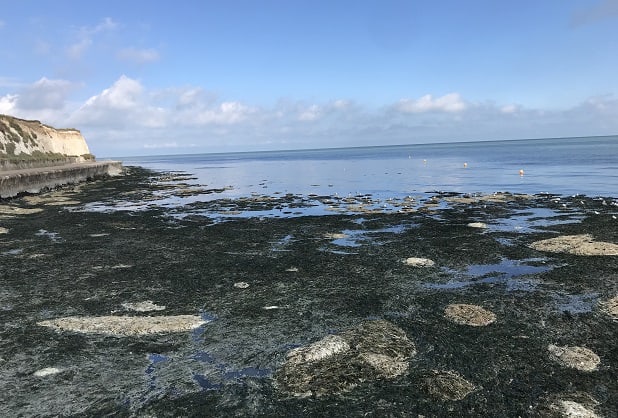
Unusually high levels of seaweed have been covering Thanet beaches this year.
Thanet council says its staff have collected 1,000 tonnes over the 5 weeks from the beginning of July compared to usually collecting between 400 and 800 tonnes in a whole season.
Rough seas, higher tides and strong winds cause large amounts of marine material such as seaweed to get washed up on beaches regularly around the UK. Warmer seas can also be a contributory factor, the Marine Conservation Society says UK sea temperatures have risen 2°C in the past 40 years. Research suggests that cold water seaweeds are moving further north where it’s cooler, while the range of warm water species is expanding.
Non-native species – those that wouldn’t normally be found in the UK – have also found their way to our seas, mostly due to human activity. Further afield high Sargassum levels of recent years are tied to nutrient-rich water running off land into rivers and out to the oceans, where it can fertilize the seaweed.

Seaweed, which is an algae rather than a plant, is a natural occurrence, however build ups are removed from Thanet beaches during June to September.
It is left during the winter months (October to March inclusive) to help provide the foraging ground for the internationally important winter visiting birds, such as the Turnstone. This is important so they have enough energy to migrate to the tundra to breed over the summer and is a legal requirement of the Special Protection Area (SPA) for these wintering birds.
A statement from Thanet District Council says: “Seaweed is a natural occurrence on our coastline and the chalk reef where it grows is protected by law. This means we are not able to remove seaweed from some locations.

“This year has seen unusually high levels of seaweed on some of our beaches. We have collected 1,000 tonnes over the 5 weeks from the beginning of July. We usually collect between 400 and 800 tonnes in a whole season.
“Seaweed is removed from Thanet beaches between June and September and taken to a local farm. This is done under licence from the Environment Agency. The amount that can be stockpiled at the farm for spreading is limited. This is to ensure that the nitrate levels that the seaweed releases into the soil remain at the correct level for growing food crops.”
Thanet council deputy leader Helen Whitehead says the collected seaweed cannot be used for biofuel because by the time it reaches the beaches it is already decomposing, which means it doesn’t release sufficient energy.
The seaweed build up is removed on a rotation system from designated bathing beaches. However, the council is unable to take it from places such as Beresford Gap, Grenham Bay and Epple Bay due to the chalk reef extending up to the proms and slipways. Staff are not permitted by law to drive vehicles over the chalk reef which is protected as it is a Special Area of Conservation.

Seaweed is also not removed from Kingsgate Bay as it is not a designated bathing beach and there is no access for the heavy plant machinery required in the collecting and loading of seaweed for removal.
Margate Main Sands hasn’t had seaweed removed for some years as it has not been required.
Seaweed is removed from designated bathing beaches including – Botany Bay, Stone Bay, Viking Bay, Joss Bay, Fulsam Rock, Margate (The Bay), Minnis Bay, Ramsgate Sands, Western Undercliffe, St. Mildreds Bay, Walpole Bay, West Bay and Westbrook Bay.
Thanet council says it is now looking at how the seaweed issue can be dealt with in years where beach wash up is particularly heavy.
The authority says: “We are committed to keeping our beaches looking beautiful and have been actively managing seaweed from our main bathing bays.
“This season environmental conditions have provided ideal conditions for the seaweed growth and depositing on to our beaches.
“We are currently looking at what we can do during the heavy seaweed years, as they are likely to increase as the climate changes.”

